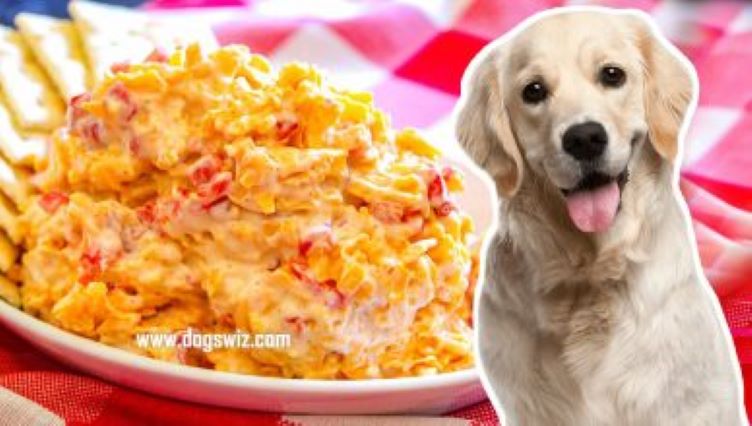Many people love to put pimento cheese into their sandwiches and use it as a spread to their bread and cracker. It is beneficial to our’s health and enhances the taste of food. What about the food for dogs, though? Is it good for dogs as well? Let’s find out.
The answer to “Can dogs eat pimento cheese?” is yes. But feeding pimento cheese in moderation is important, as is keeping an eye on the ingredient list. Pimento cheese is a great treat with a strong flavor and rich taste which isn’t toxic. However, it’s important to remember that, like all cheeses and dairy products, or any food in general: moderation is key.
The main ingredients of the formation of pimento cheese i.e. cheese, mayonnaise, and pimentos are all non-toxic to dogs. But sometimes additional flavoring and lactose intolerance or allergies can make it dangerous or even toxic. So be sure to keep that in mind.
Make sure to keep reading to know what’s in store for your pup if they eat pimento cheese.
What Makes Pimento Good For Dogs?
Pimento cheese, in addition to having rich and extravagant flavor, has some nutritional value for your canine companion!
Pimento cheese is high in protein. It consists of almost 5g protein per portion size. High protein helps to have stronger muscles, more bone and body mass, enhances neuron function, increases cell formation, and can aid with wound healing. However, rather than just trying to meet your dog’s protein requirements with pimento cheese, you should strive to meet their protein requirements daily with high-quality, meat-based dog food.
Pimento cheese also contains very little sugar. This means you can treat your pooch a tasty treat without having to worry about diabetes or obesity.
It is also rich in other two vital minerals: Calcium and Sodium. Calcium is vital for the formation of teeth, bones, muscle contract, and proper blood clots. Similarly, sodium helps in maintaining muscle cells and nerves. As good as it is with appropriation, it can create problems if overdone. High sodium can cause lethargy, weakness, and even seizures in dogs. So keep in mind to control the amount of cheese you offer.
Pimento, the major ingredient of pimento cheese, contains vitamin A and vitamin C. Vitamin A supports healthy vision, the formation of organs, and whole immune function. Vitamin C helps minimize inflammation, support healthy aging, and eliminate potentially damaging free radicals in your pet’s body.
Fortunately, pimento pepper also contains very little capsaicin which makes it an ideal choice for your furry friend.
Ingredients To Look Out For
As mentioned, all the vital ingredients used in pimento cheese are harmless. Some pimento cheese, however, may cause complications depending on the recipe or brand. Some pimento cheeses may contain ingredients that are not just unpleasant but also poisonous. Here are some of those ingredients that you must look out for:
1. Onion and garlic powders:
Onions and garlic powders present in some pimento cheese are toxins to dogs. They are allium species that contain thiosulfate, which causes irreversible oxidative damage to red blood cells and can cause amnesia in dogs. This implies their red blood cells are unable to transport oxygen throughout their bodies. In addition to that, it can cause different other problems like:
- Lethargy
- Vomiting
- Dehydration
- Abdominal pain
So don’t give anything that contains onions, or garlic to your pet. If your pet accidentally consumes a large chunk of cheese with garlic and onion flavorings, rush them to the veterinarian and give the required treatment.
2. Lactose:
The other thing to consider before giving dogs pimento cheese is lactose. Lactose intolerance is the condition in which a body isn’t able to digest lactose content found in milk and dairy. So, to find if your pup is lactose intolerant, first, give them a small bit of milk. Observe their intestinal health for the next 24 hours, and watch out for any of the following symptoms:
- Diarrhea
- Bloating
- Vomiting
- Flatulence
- Constipation
- Nausea
If you find that your pup is lactose intolerant, make sure you fully eliminate dairy products from their diet. You can make an appointment with your veterinarian to have your dog’s condition evaluated.
Conclusion
Dogs can eat pimento cheese if there are no other added flavors and your furry friend does not have lactose intolerance.
Always consult with your veterinarian before introducing any new food, and remember that moderation is the key. Pay attention that pimento cheese isn’t replacing dogs’ daily well-balanced dog food.
Thank you for reading the article.
Here are some other cheese-related dog articles that you might be interested in.
Has your dog ever eaten cheese? What was their reaction like? If you have any experience with dogs eating cheese, please share it in the comments section below.
